"If everything is amplified, we hear nothing." |
The Daily Show's chief satirist and presenter, Jon Stewart |
"Because today we live in a society in which spurious realities are
manufactured by the media, by governments, by big corporations, by
religious groups, political groups... So I ask, in my writing, "What is real?" |
Science Fiction Author, Philip K. Dick |
"Movies don't change the world." |
Director/Actor, Werner Herzog |
To prevent accusations of insularity and ageism not to mention a mighty "J'accuse!" for attempts to justify some appallingly narrow views, I thought I'd hang tradition and clear things up in a preface to stop a prospective reader from being tripped up in the article itself. Insularity presents itself in the relatively narrow and mostly mainstream range of the films that have truly touched me included in this massively self-indulgent collection of film excerpts. That's just the way my youth went. Given this site celebrates the eclectic and widest global swathe of cinema, I thought I'd better let you know I am aware of my own shortcomings in this regard and of the paucity of more diverse works in the list. Ageism crops up because more than once I conclude that teenagers today are not getting cinematic succor at any sort of level that I did once as a callow but enthusiastic youth. That, of course as the saying goes, may just be me. I am at a loss to understand this and fear I may be guilty of plucking gross generalisations out of the air. The narrowing of my views on this subject reflects the barest research I have been able to do so think of this piece as a cri de cœur, a call to arms, a plea that we may be touched by light again in a way that truly changes us.
Can you name a single life-changing event in your past, something that affected you so deeply it altered the course of your entire future? Of course you can. If you have an ounce of passion in you then something has sparked it, given it a powerful push, be it a gradual shove uncoiled from your personal circumstances or interactions with extraordinary and inspiring people. There are probably many micro-events that have steered you forward, some you're conscious of and some subliminal ones that you may never know you had been affected by. It's fair to say that most film-makers can point to a few significant movies in their formative years but whereas those in my generation sought out movie experiences when young and impressionable, today's teen and early twenty-somethings have to make a considerable effort not to have media thrust at them. Movies seem to be mere distractions to the majority of today's audiences, light confections to be consumed and forgotten. They seem to have little power to profoundly affect the current younger generation. But then again, what's on the menu doesn't help and yes, this is more of a mainstream gripe. I'm looking at this from a pitiable narrow perspective (conversations with teenagers of my son's age) but I'm convinced that the once great power has been sucked from the cinema like air from a space station as Sandra Bullock yanks open an airlock. I have based this conclusion on another narrow but for me accurate view; François Truffaut's maxim that a great movie is one that can be re-viewed and re-viewed and still deliver fresh pleasures, unearthing different layers of meaning and emotional responses.
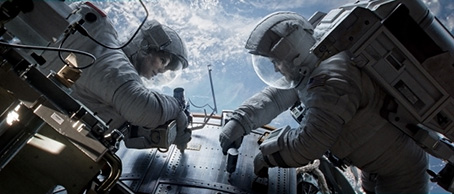
I liked Gravity very much (I was in awe of the effects work) and for family reasons will probably shell out for the Blu-ray but it's not a movie I feel I could re-watch and get anything new. As long as there is enough of a gap between viewings, my palms will be sweating when I share it with my loved ones in a few months but that will be that. It's a superb film but it has little resonance beyond the "Will they/won't they make it?" question. I read somewhere that most favourite or significant films are chosen and encased in memory-amber at the age of 17. That suits me frighteningly well as it was a late night screening tipping over to the actual day of my 17th birthday when I first saw my most significant film. Maybe age is more relevant and significant when it comes to being affected by a movie. Maybe profoundly moving films have such a small window of opportunity to really wrap themselves around our souls. Is it the often-perceived (but never truly proven) apathy of the younger generation partly responsible, the idea that 'cool' does not admit or allow great passion for anything? Cool's own DNA, 'Detachment', 'Not Caring' and 'Aloofness', are the enemies of a deep emotional connection and if you're young, the very last thing you cannot afford not to be is 'cool'. When I taught a six-week cinema course to a group of thirteen year olds in 2004, I was not surprised that almost every one of them name-checked the same movie as their favourite. I was heartened that this was a movie that could be re-watched with many rewards but as for it deeply influencing them, I couldn't tell. I know you're curious but you shouldn't be surprised to learn the film was (drum roll...) The Matrix. What was doubly heartening is that all of them despised the sequels.
I also did a presentation to university students during their short film festival in 2010 and that is what I want to feature here. I was determined to make them think intensely about what their motives were in being there on a film course at the most urgent and passion-filled years of their lives. Film and Media student numbers have increased by 240% from 2004 to 2012. It's a very attractive subject with a significant downside. 34% of film students end up in retail or catering jobs. In the UK, the so-called film industry is regrettably tiny compared to the number of people desperate for a job on a movie set or in post-production. As a friend of mine, an editor of some note, said "I feel really sorry for those wanting to break into the industry now..." So the idea of my presentation was to show them what sparked me, what ignited my passion for film and led me to where I am now (wherever that is). I wanted them to know that to succeed they had to burn white with desire, want it more than anything and be hungrier for it than the person sitting next to them. So if it's not too self-indulgent (ha!) I'd like to share those moments that touched me, moved me in ways hitherto unknown to my then budding psyche. They steered me, buffeted me but most of all for a film nut finding no solace or value in higher education in the late 70s, they nourished me. But that appetite for film never left and I hope it still burns inside, if less brightly, then statelier and more refined than the ragged flames of my youth. If you were one of the students in my small but enthusiastic audience, forgive the going over old ground...
TOUCHED BY LIGHT
How Cinema Shapes Us
At the heart of this article is a question I want to ask you. It's a very simple question but I hope your answers have a solid foundation. Don't panic, there won't be a test. First of all, an invitation to use your imaginations... Imagine a world in which you got dressed in the morning under the bed covers because no one had lit the fire yet and you could still see your own breath it was so cold. It's a world in which the highlight of your day was a bar of chocolate with three faces on it, avoiding a new vegetable or dressing up as a cowboy. Still with me? Imagine that all you knew about the world was what an exclusive club of journalists told you on a few dozen large white sheets of paper. And then it was many days after the event. But there is something in this bizzaroland that's familiar to us in our world. In fact it's startlingly familiar. It's high definition, (yes, we had high definition in the 1960s). It's moving pictures, it's the picture houses. It's cinema. It was literally – as hard as that is now to believe – the only screen in town. Imagine that – no Facebook, iPod, iPad, DS, Play Station, Wii, – no computers unless you count the ones the size of shopping malls. Hell, no TV! There was just the once mighty and now heavily mutated cinema. This strange world is of course the past (which is where I come from and it's also where you're all from too).
Now how can cinema be High Definition? HD has the definition of 1920 x 1080 pixels. Have you seen good HD? A top notch Blu-Ray? Ah, but have you ever seen a first generation print off a 35mm negative? Jaw dropping... No, seriously jaw-dropping. I was a rushes projectionist in the 80s and was in a serious amount of awe at the staggering quality. What about relative resolution? HD is 1920 by 1080. In comparison (with lots of other factors to take into consideration) you can get 4,000 lines of resolution from a piece of celluloid little more than half a square inch in area. So that was then. What about now? You are smack dab in the middle of a media custard pie fight. Everyone wants your attention, every business is clawing at your pockets, every street poster, advert, promo, internet pop up and unbidden web page is assaulting your senses. Yes, advertising existed in the 60s but nothing, not one single, tiny thing, like today. If the subject of this article is 'Touched by Light' your generation needs serious sunblock. I was watching my son doing his homework by looking something up on the internet. He had one ear bud of his iPod fixed in place and was sort of watching something on that. He had his Wii controller next to him but there was a DVD playing on the TV. I don't know who coined the term but 'screenager' is just about perfect. He was convinced he was concentrating. And he may even have been but not in any fashion familiar to me. In Ken Robinson's rather great book 'The Element – How Finding Your Passion Changes Everything' he came across his son in a similar situation and he put it a lot better than I just did. He says:
"When my son, James, was doing homework for school, he would have five or six windows open on his computer, Instant Messenger was flashing continuously, his cell phone was constantly ringing, and he was downloading music and watching the TV over his shoulder. I don't know if he was doing any homework, but he was running an empire as far as I could see, so I didn't really care."
My university students had the advantage of seeing the whole clips themselves not just frame grabs. There are several very good reasons why we can't just publish clips from copyrighted movies on these web pages but I will include the grabs and if so moved, I'm sure you can find the relevant excerpt either on You Tube or (heaven forbid) in the movie itself. I will describe the content of the choices but not so much that they are robbed of their power in the context of their own movie. I can't believe that in making the grabs from John Ford's classic The Searchers, I got teary eyed at the end... again!
OK. This is what a blank slate looks like:
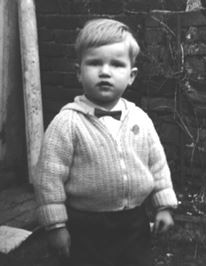
In Latin it's called 'tabula rasa', a clean, blank page that cinema is about to damage, wonder and terrify. It's hard to imagine I was ever a cinema virgin but that picture's the closest I'm going to get. That little guy had no idea what was coming and the really odd thing is that the people who are supposed to be taking care of him actually exposed him to these damaging, wonderful flickerings. This is hardly surprising as my mother started labour pains in a cinema. Ben Hur if you're curious. The majority of folks in the UK probably shared my parents' beliefs at that time. Smoking and drinking was for adults although some naughty children managed to start their vices early. I was brought up with a robust moral code and some sound advice from my concerned mother; "If you have to hit your sister, don't hit her in the stomach..." Just in case you think I was a developing sociopath, understand that my sister was four years older than me and therefore we were genetically programmed to fight at any opportunity. So, unversed in the ways of the world as we all are as children, what better way to get some experience of what was out there than to go to the pictures? Aside from being dragged screaming out of Bambi once the storm started, my first real cinematic formative influence was the Avatar of its day except that it was really good.
Dollars per minute, this was the most expensive movie ever made at the time. It was 85 minutes long and in terms of exploiting a recently invented genre's technical limits, it was cutting edge. Although I couldn't appreciate it at the time, technically the movie was and still is a marvel. So in I went all wide-eyed at the age of about 6 (a perfect age to be damaged) and when I came out I was different. What I'd seen and heard affected me like nothing else up to that point. The experience of seeing the film is still my earliest memory. So what damaged me?
This did.
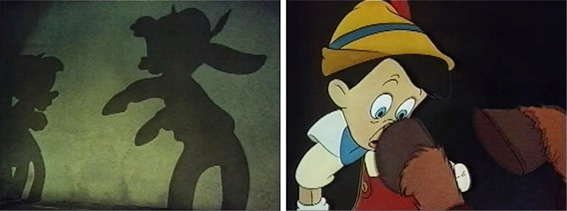
Children are being tricked in to running riot at an amusement park but theirs is a high price to pay. For all their smoking and drinking, their freedom is short lived as Pinocchio's friend, Lampwick – in front of his eyes – metamorphoses into a donkey, slave labour for evil men. Pinocchio is next...
So you're thinking. "Pinocchio's just a cartoon..." Well, a knife is also just a kitchen implement until you cut yourself on it. Do not be mistaken about the power of early influences, animated wooden boy or not. If you want dark, you should read the original Carlo Collodi story. That sequence reinforced and cemented my notions of drinking and smoking as very bad things to do (they didn't stick I'm afraid although I can say that my first and last pint were imbibed on the same post-exam night and no beer or lager has passed my lips since). This extraordinary sequence frightened me in a very profound way, and not just of turning into a donkey if I strayed from the straight and narrow. This was a marrow deep scar. When you have very little life experience, most things are possible if extremely unlikely.
My parents felt as I reached the older age of about ten, I would be allowed, after much pestering, to see a relatively mild scary film. I was so scared of films that had adult certificates, I thought they must have unimaginable horrors or seriously kinky stuff. The horror of what was behind masks or waiting for me in the dark was very real. I was genuinely frightened of images that today's generation would think risible. Time passes. Of course the imagination is strong. I could claim to be mixed up as a child. I was supposed to respect The Prince Of Wales but there was a porno cinema in the centre of my home city with the same name. My parents' word for a penis was 'peter' (look it up, it's for real) and yet I watched 'Blue Peter' on TV. And I'd fight anyone who tried to convince me that the man playing James Bond wasn't pronounced 'Seen' Connery. So after much debate between my parents, I would be allowed – with supportive mum and dad sitting either side of me – to watch a scary film. I settled down nervously to watch The Birds on TV. My reaction to one scene was very similar to the reaction of the woman in the sequence.
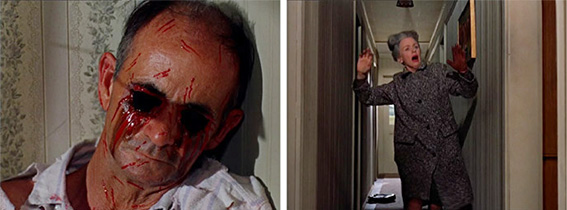
There have been unexplained bird attacks throughout the area and the mother of the hero goes to her old friend to ask some questions. She finds her old friend looking like this...
I have since developed a serious phobia about eyes and cannot watch movies with eye violence thanks to Hitchcock's classic. Despite the damage Pinocchio had wrought, I had asked my father to tell me who did that on the screen and he said "an animator..." So I drew and drew and drew for four years until another movie convinced me it was the filmmaker not the animator who was responsible, the job I so wanted to do when I grew up. So, after a good two hours and twenty minutes, the second of my three distinct cinematic formative influences ended. My father was expecting a sort of Star Wars and left the cinema confused and pissed off. I left it soaring and almost shivering with excitement. I was not old enough to appreciate its greatness but maybe that was just as well. 2001 A Space Odyssey knocked me sideways and still does...

After a few mishaps on board the spaceship Discovery One, surviving astronaut Dave Bowman, ventures out into the void and encounters the 'star-gate' that will take him to an alien presence.
And the extraordinary thing is that this celebrated star gate effect that so thrilled audiences in 1969 (people often got stoned to watch it) is now available as a bundled effect in the Final Cut Pro editing package. I can't explain how I reacted when I first saw that but the memory is soldered on to my motherboard. It was the first film that I 'felt' rather than was simply exposed to. It was a true non-verbal, visual experience.
Let's go back to scary. The coolest thing for a 16 year old to do when I was 16 was to get into an 18-certificate (or as it was then, an X) movie. We had no ASBOs for peer respect. The Observer's critic, Mark Kermode is famous for championing a specific movie – you know the one? Well, it was on the shelves at a local Woolworths (remember Woolworths?) quite a few years ago and a group of schoolgirls were talking about it. "Is this any good?" "Naah, s'rubbish." I wanted to shove them into the Tardis, sit them down in a 1974 cinema, lock the doors, play the movie and then ask them if they still thought it was rubbish. When I came out of the cinema after The Exorcist, I was shocked and thrilled but more because of how it was shot and edited. It's a master-class in slow burn horror that puts a lot of modern horror to shame. It's all the time taken in between the encounters with the demon that make those encounters so extraordinary.

A girl seems to be possessed by a demon and in this encounter asks the visiting doctor to engage in paedophilic intercourse with her. Everyone is frankly surprised by this request.
So to the last of my three primary cinematic formative influences and the three go together rather well. The first was Pinocchio, the second, 2001 A Space Odyssey. So let's put those two movies into a blender – wish fulfilment and meeting extra-terrestrials. It's no secret that the director of this third movie wanted the theme to Pinocchio to play out over the end credits (but at first he got cold feet and reinstated the tune in the Special Edition released a year later). The title of the film, in hindsight, also put a fateful mark on this being my third big formative cinema experience. I was in for a close encounter of a third kind.
Interesting and true story (which I included in my review of the DVD so forgive the repetition): For my 17th birthday my parents allowed me to paint the walls of my bedroom black (cinema-like, you understand). A small patch of white stood out, on which I would project my 8mm movies. But, preparing to leave to see Close Encounters, I gave in to an instinct to mark my territory. I put up a poster, a Snoopy poster on which the caption above the dog said "It doesn't matter if you win or lose... until you lose!" It had an orange background. I thought nothing of it. A few hours later I was watching Richard Dreyfuss pulling up pot plants to lend some verisimilitude to his 3D model of Devil's Tower (in his living room). The kids and his wife were a little surprised at his behaviour but not as bloody surprised as I was. As human beings, we are prone to imbue coincidences with significance. Well how's this? On the Neary children's bedroom wall was the exact same poster I had put on my wall a few hours earlier. It felt like Spielberg had reached into my head and in an act of extraordinary magic, placed that poster there on his screen so I could marvel at the inner machinations of the universe.
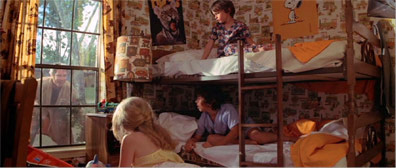
It was like Spielberg had put "Dear Camus," at the start of the movie. But the real experience was still an hour away. Once I saw this scene I was a sack of awed joy in a cinema seat. I couldn't believe what I was seeing. Remember, no CG was used – these are all practical effects by masters of their craft. I felt indescribably happy and I understand that not everyone has the same experience with similar movies or we'd really live in a boring world. I took twenty-nine people twenty nine times to see this movie during its first run. Not one of them had anything like the experience I had. The relevant scene is of course the mothership revealing herself to the stunned human beings, an enormous city of lights defying the laws of physics and rather weirdly appearing from the ground up and over Devil's Tower.
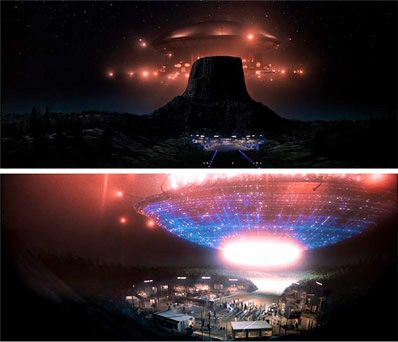
I got nothing that approached that experience in subsequent cinema-going but I do want to share some of the finest moments since then and talk about why I chose them. Not to hammer it home but almost all these clips use no computer enhancement of any kind (how could they? We're still in the 70s and 80s). The next scene is from a war movie but it's an excerpt of such power and intensity that it saddens me you don't have the opportunity right now to watch it in an appropriately advanced cinema. I want you to imagine the work that has gone into it. There are no fake backgrounds – all the actors are in the air. There are no fake machines, no models, miniatures, no mattes, no special effects or trickery. If a vehicle blows up, they blew it up for real. Imagine the audacity of the vision of the director. And have some sympathy. Making this movie gave its star a heart attack and the director slid into real madness. For all that, enjoy the highlight of my 1979's cinema-going.
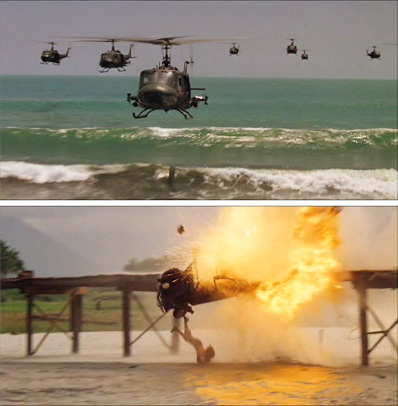
It's Vietnam at the height of the war. Colonel Kilgore (you couldn't make that name up. Wait, someone did...) wants one of his soldiers to surf a beach so he and his cohorts blow several shades of excrement out of a village accompanied by the horribly violence-inspiring 'Ride of the Valkyries'. Action and irony do not get any better than this. And it's all for real. Apologies but I want to keep reminding you.
Now let's move into those moments that make you go cold – sequences and shots of such power, they make your spine tingle. BE AWARE! It's the CONTEXT that makes them work so you're getting a very diluted version via two frame grabs but it's better than nothing and might make you go out and discover these movies for yourselves. A second scene from The Birds, this is one of those sequences whose sound (or the one endlessly repeating song) burns into your brain as the tension mounts.
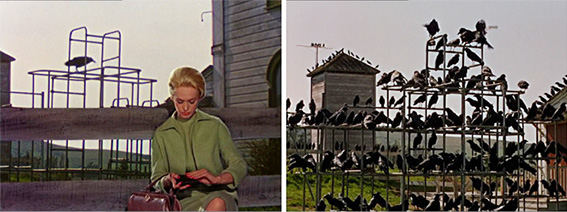
There have been unexplained bird attacks throughout the area and the heroin goes to meet with her love rival who teaches at a local school... Feathers accumulate...
This next one still stands out as an extraordinary sequence but I just can't believe the power of it. It's some kids singing but...

In Germany of the 1930s, a young American singer is trying to make her name. A shy English teacher and the girl's benefactor (who are starting to develop homosexual feelings for each other) meet up at an outdoor café and get caught up in an extemporaneous display of national pride. Hitler's Nazi party was starting to get a foothold.
If you were locked in a room for six months with only Bob Fosse movies, you could claim to be an editor when you emerged. The man's command of visual juxtaposition is second to very few. Yes, his editors must take some credit but Fosse surely supervised and directed the editing of his own movies. Try and find this sequence online – oh hell, here it is...
I know it's out of context but if you do not get goose bumps during this sequence then my taste and yours are too different to find common ground. Even out of context this sequence is absolutely terrifying knowing a little history. When the corpulent businessman stands up and his jowls wobble with the ferocity of passion, I feel a stark chill in my bones. That last line... "Do you still think you can control them?" and that cut to the MC of the Cabaret – just cinematic genius.
And if you need any more persuading, here's another scene from the same film – cinema as metaphor and an abortion rendered cinematically – look out for what the director uses to symbolise the birth canal and subsequent release. Masterful. The only thing truly shocking in the scene is the director's talent.

The singer, Sally Bowles leaves in a fur coat, sees a child kick a red ball down the stairs. It's dark and womb-like, curtains open to reveal deep red and the hysteria of a metaphorical abortion is acted out on stage before we return to Sally now fur coatless, the price she paid for the procedure.
In order to cover all genres, let's have a western up next. I'll just introduce the clip and provide its context.

Comanche indians kidnap Debbie as a very young girl. Her uncle Ethan begins a decades long search for her, his hatred for the Comanches festering until he's just six foot four of vengeful loathing. He is now convinced that all he can do is kill the men that did the deed and also his niece as she's now a Comanche herself... Members of his family know he's out to kill Debbie and try to stop him.
I know it's out of context and the climax of the movie but here's the sequence...
I get all teared up just watching that again and I've seen it about twenty times. I don't excuse myself for being moved by that... Here's the interesting thing. French nouvelle vague filmmaker Jean Luc-Godard despised John Wayne for his extreme right wing politics as would any compassionate human being. After he saw this scene in the movie, he said:
"How can I hate John Wayne and yet love him tenderly in the last reel of The Searchers?"
That always touches me too.
The next scene is from a beloved TV Show. It's a great example of how to do shock after a loved one's death. I won't bother with introductions. I'm hoping you're all familiar with a certain vampire slayer? She comes home to find her mother dead and has to break the news to her sister and friends... We start on her sister in school, in art class.

I adored the use of silence in that scene and the choice to play Buffy's sister's big scene from inside the classroom as if we are intruding on a very private moment. Writer/Director Joss Whedon manages to inject great weight into the fantasy context of the show. But as an example of cinematic (yes, I know it's TV) grief, this scene is hard to beat. The silence works wonders.
This next one's a single shot but one of those shocks of surprise that continues to delight in the middle of a fine genre movie.
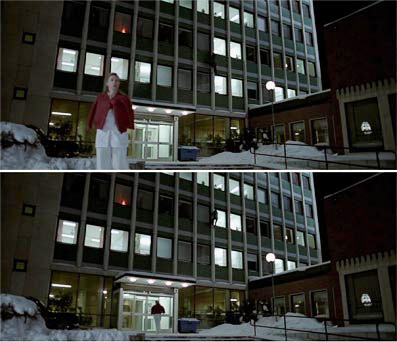
A young vampire has been picking off the populace but her protector has been injured. She pays him a visit in hospital...
You can't appreciate this in a series of still frames but be assured. When the outline of the little girl starts climbing up the side of the hospital you gasp and quietly applaud the filmmakers. It's all misdirection and great direction at the same time. Take a bow Let The Right One In director, Tomas Alfredson.
Let's move on to an extraordinary experience I had in a London cinema almost twenty-five years ago. I went with a friend and as the credits rolled we both sat there stunned and didn't move or say anything until the credits were over. We didn't say a lot on the walk back home either. It was a wonderful example of cinema being able to elicit an emotion that seemed totally surprising to both of us. I have to say we seemed to be the only people so moved in the audience so maybe it was just us. Maybe there really is something wrong with me...

If the students want Mr. Keating's attention, they must quote poet Walt Whitman's phrase "Oh captain, my captain..." This is the final scene in which Keating packs up and leaves. His students have been forced to sign papers than blame the teacher for the death of a student. One, followed by many others, show him serious respect.
Even preparing this clip sent me scurrying to email the girl I first saw it with and I just got all glistened up again! She replied...
"Of course DEAD POETS would almost certainly have me in pieces again because I feel a bit wobbly thinking about it right now..."
All that's gone on before was my longwinded answer to the question I want to ask each of you. But to give it a little bit of spice, here are two clips that ask and answer the same question in their own unique ways. Enjoy.
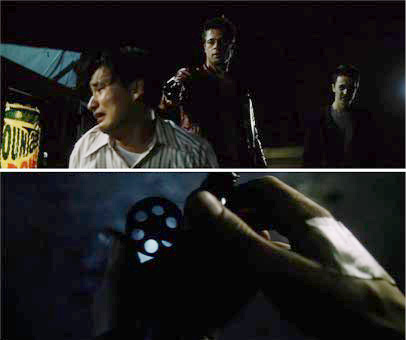
In Fight Club, Tyler Durden is on a mission. Taking a store clerk out and threatening him with an unloaded gun, he basically scares the crap out of him to motivate the poor guy to do what his passions demanded... It's an act of kindness of a sort.
...and another way of asking the question?
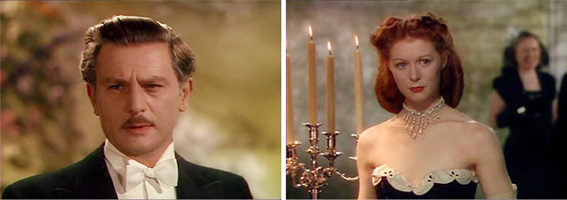
In Powell and Pressburger's sensational The Red Shoes, the ballet impresario asks the up and coming Vicky Page "Why do you want to dance?" She answers with another question, one that is pure passion in action:
"Why do you want to live?"
"Well I don't know exactly why but I must!"
"That's my answer too..."
My question to you all is this – and please think about it... (remember this question was directed to the film students in my audience...)
WHY ARE YOU HERE?
...in higher education, learning about film and TV? What drives you, pushes you, almost forces you to study this particular subject? I've tried to answer that particular question from my perspective with the afore mentioned sequences. Who can explain these things rationally but there has to be something or someone that's happened to you to make you take this step. You are building the foundations of your lives in higher education. It would be great to know that you're doing it out of love and passion and not a whim because it seems 'cool'. Media has ballooned as a career option and the reality is a lot smaller than that balloon. Ask yourself why you've chosen it and be sure it's a road you want to be on with all your heart. It's a difficult career path and you need that passion to keep you on it. And remember that hoary old Confucius cliché which accrues a lot more resonance the older you get:
"If you love what you do, you'll never work a day in your life."
|